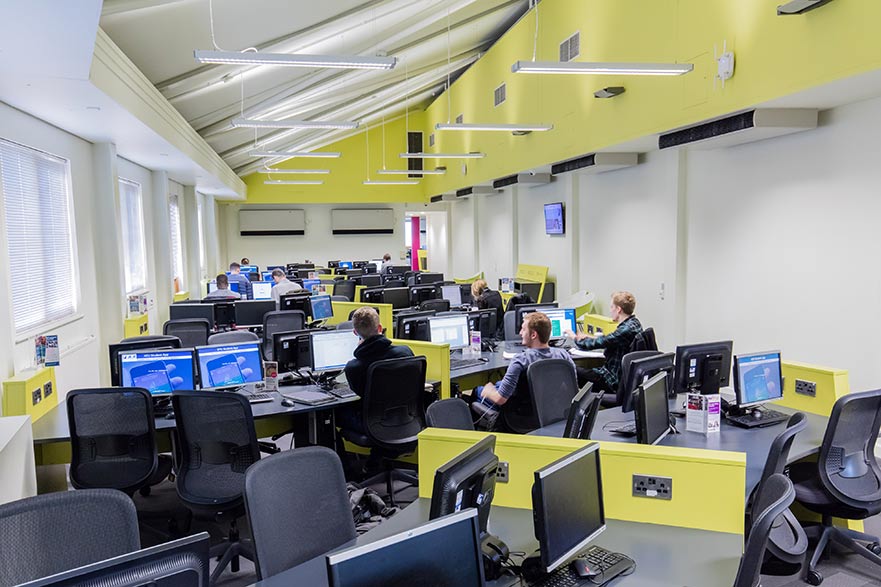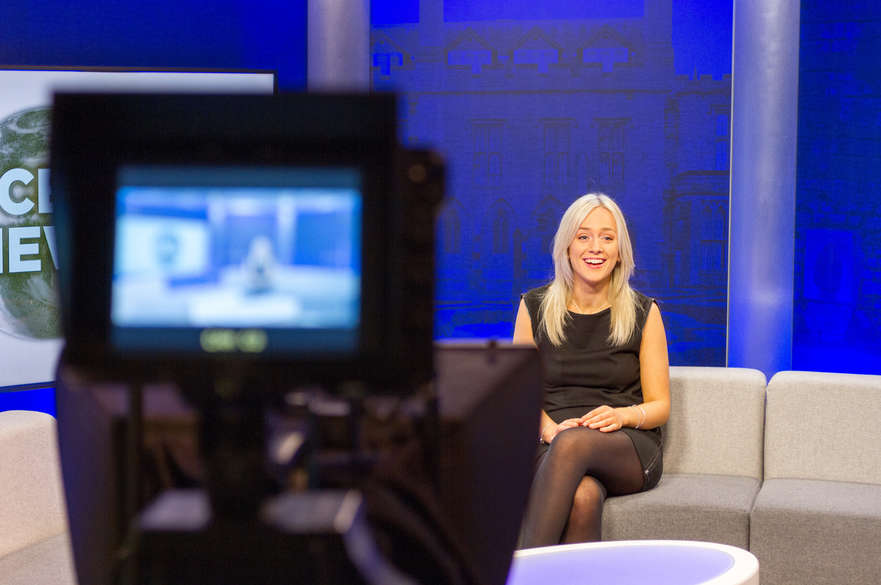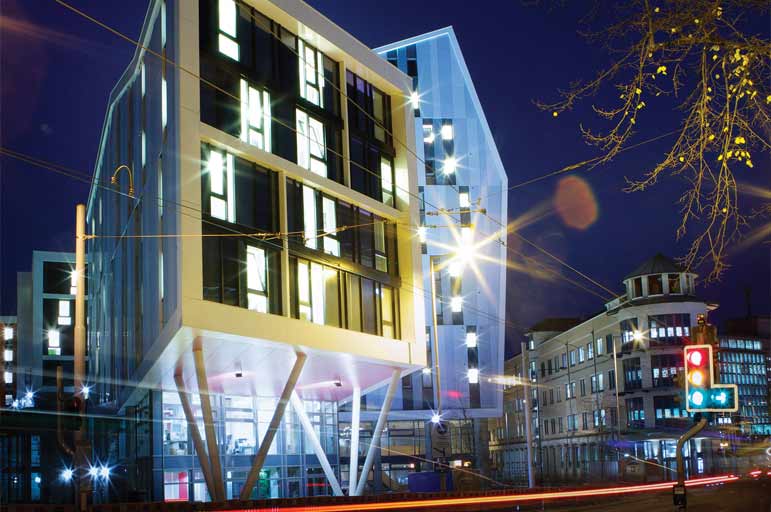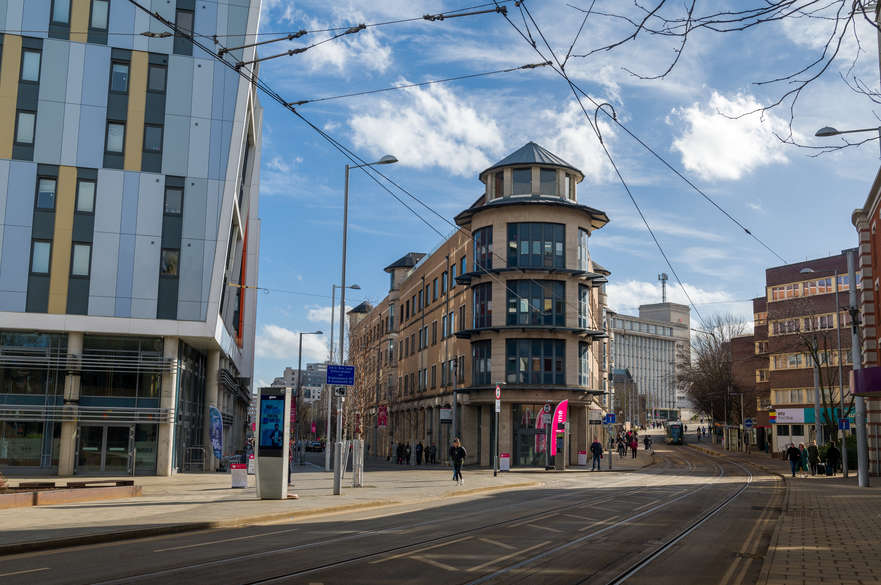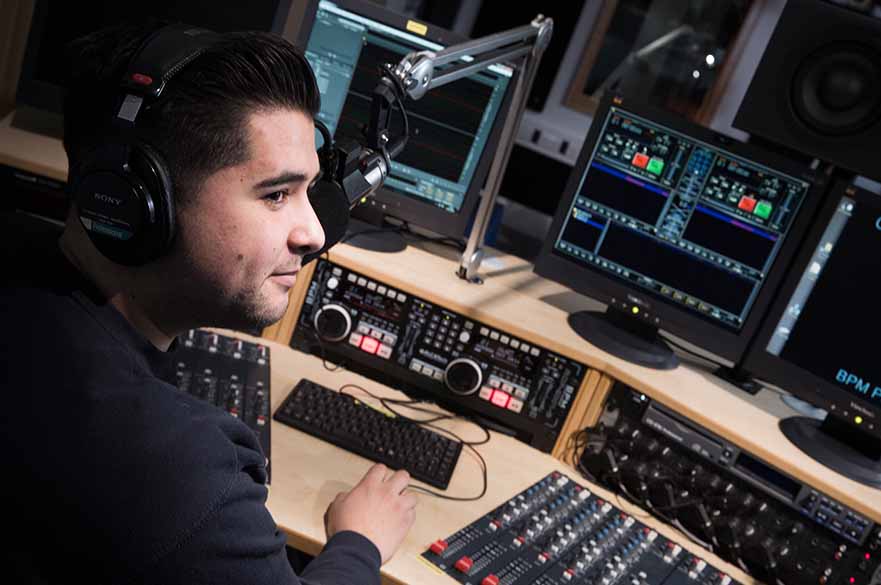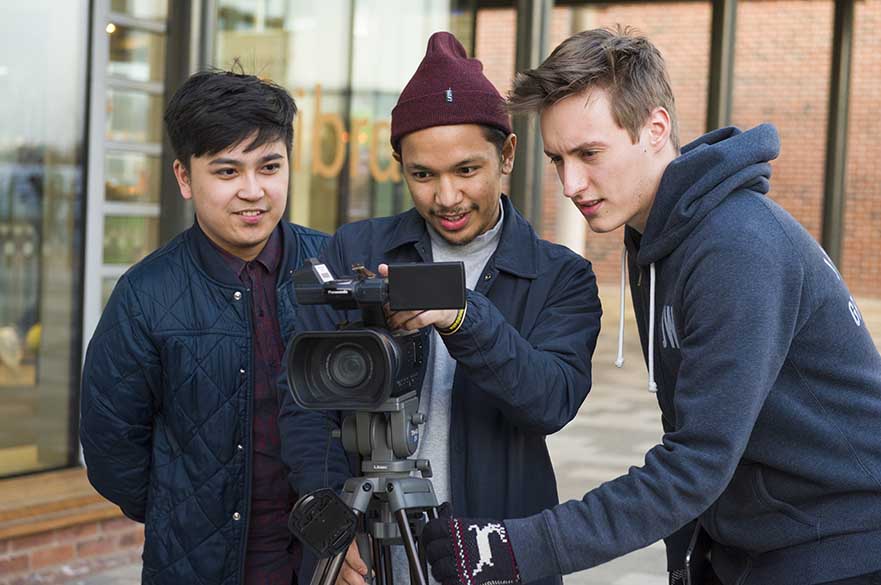About this course
Get ready to embark on an exciting journalist journey. The BA Journalism course is all about sparking your curiosity and empowering you to be a storyteller.
We'll teach you how to gather news, write, produce videos and audio, and adapt your stories for various platforms like online, social media, and print. It's not just about journalism – it's a pathway to careers in PR, campaigning, marketing, and more.
You'll dive into media law, government workings, ethics, and global issues. Plus, you’ll sit NCTJ exams, meaning you'll earn the industry's gold standard qualification alongside your journalism degree. Fees for the first attempt at these exams are included in your course costs.
It's a unique opportunity to make your mark in the world of journalism!
-
NTU is in the UK’s Top 30 for Journalism in the Guardian University Guide 2025
-
Specialise with optional modules including, sports, news, fashion, photography, podcasting or celebrity journalism
-
You'll be training in our industry standard facilities within the Centre for Broadcasting and Journalism.
-
50% practical, 50% theory - you'll back up your practical skills with theory and knowledge of best practice, media law and shorthand.
Interested in Journalism?
Get involved with a summer course specially designed for 15 - 17 year olds.
Browse courses for 15-17 year oldsWhat you’ll study
As well as the traditional skills of writing for newspapers and magazines, interviewing, media law, politics and shorthand, you’ll be given digital skills including writing for online, the use of social media in journalism, and creating and using video content. You’ll also gain a range of transferable skills that can be used in a range of media industries from public relations to communication officers.
Journalism and Society (20 credits)
Explore newspapers, radio, television, and online media with a critical eye. We'll unravel the intricate relationship between media and society while delving into their role in shaping norms and challenging conventions.
Introduction to Journalism Practice (40 credits)
This module equips you with essential skills, from sourcing stories and interviews to online writing, mobile journalism, and content creation. Assessment includes professional practice standards: punctuality, engagement, equality, and more. Explore news values, writing, and multimedia journalism.
Introduction to Media Law (20 credits)
This fascinating module invites you to master legal concepts, courtroom reporting, and ethical content creation. It aligns with industry standards and includes court visits and insights from experts, to give you a working insight into court protocols, and ensure your content is legally safe and ethically sound.
Public Affairs (20 credits)
You'll explore both local and central government in our country, understand how they work, and uncover intriguing political stories. This adventure blends politics and journalism, making you a skilled and informed journalist ready to tackle real-world issues. From the Prime Minister's role to field trips, it's a dynamic experience. Expect real-world engagement, expert insights, and a path to navigating the world of government and journalism.
Introduction to Journalism Studies (20 credits)
This module is your key to understanding journalism's core, its global impact, and the skills essential for success. We'll investigate journalism's significance, emphasizing safety, confidence, accuracy, and cross-cultural communication. Meet real journalists, dive into practical insights, and build a captivating portfolio.
Core modules
Journalism Practice 1 (20 credits)
This module bridges your foundational journalism skills ready for Journalism Practice 2. It focuses on practical skills vital for the media world. Be prepared for hands-on learning, continuous assessment of professional conduct, and skill development in digital storytelling and editing software.
Essential Media Law (20 credits)
Expand on your Year One foundation skills by exploring media-related law and regulation. You'll gain insight into the legal aspects that impact daily journalistic work and learn to critically evaluate their effectiveness. It's a crucial step in your journalism education.
Data-led Investigative Journalism (20 credits)
Explore how to conduct investigative projects using data in journalism. You'll learn new digital research methods, tools for storytelling, and how to analyse and present data. We'll also delve into open data and examine data journalism's impact on the industry and society.
Journalism Practice 2 (20 credits)
Building on Journalism Practice 1 skills, Journalism Practice 2 delves into practical industry-specific abilities. You'll also prepare for the NCTJ Editing Skills for Journalists exam. Professionalism is key, including punctuality, appearance, and mastering shorthand. Get ready for hands-on experience and skill development.
Shorthand (NCTJ Diploma)
This module is taken as part of the NCTJ Diploma. You'll learn to write shorthand and how to write certain phrases as word groups and recognise these for accurate transcription.
Semester Two
Pathway 1: An international exchange
Travel the world, meet new friends, and have experiences you will remember for the rest of your life.
Our flexible curriculum has been designed to allow some amazing opportunities for you. Your second year of study is divided into two semesters, giving you the opportunity to take part in an international exchange. You could study with one of international exchange partners in Australia, Europe, USA, Canada, Thailand and many, many more.
Our dedicated team will support you in finding and arranging a suitable exchange. And don't worry about the cost, they will help you apply for any grants or loans you may need, as no one should miss out on the chance to broaden their horizons.
Pathway 2: optional modules
You will choose two optional modules for the following:
Ethics and Representation (20 credits)
This module explores the principles guiding ethical journalism in various media forms. You'll learn to dissect the impact of journalism, discuss ethical dilemmas, and craft your personal ethical compass for sensitive reporting. Dive into media's role in addressing social divisions while honing vital skills for academic success and beyond.
Sports Journalism (20 credits)
Develop your theoretical and critical understanding of the role and coverage of sport in contemporary society, and build the skills needed to work as a sports reporter. You'll study the links between national, regional, and local identity and sport, reflecting on how the media shapes that identity. Alongside lectures and student presentations, expert guest speakers will explain the logistics of reporting on sport and provide a greater understanding of the practical aspects of sports reporting.
Photojournalism (20 credits)
This module enables you to demonstrate skills, knowledge and understanding of the theory and practice of stills photography. You'll gain practical skills in image capture on still digital formats and the transmission of stills You'll be competent in producing stills for publication and demonstrate the ability to write clear and accurate captions and news stories. You'll understand photographic practice and media law and ethics relating to the publication of images from both professional photographers, citizen journalists and other external sources in newspapers, magazines and on related websites and social media.
Political Journalism (20 credits)
Learn to report on global and UK issues effectively. Explore the journalist-politician relationship, tackle ethical challenges, and grasp the power of journalism in democracy. Dive into contemporary topics, honing skills to effect change. It's a toolkit for your future, applicable beyond journalism.
You may choose to take an optional year-long placement in Year Three, either in the UK or overseas.
You will be supported by our experienced Employability Team to source a suitable placement.
Advanced Journalism Practice (40 credits)
After your professional placement, immerse yourself in news days, creating content for a dynamic news brand across web, print, and social media. Embrace equality through the BBC 50/50 project. Assessments consider professional conduct and prepare you for a diverse journalism career. Your work here serves as a portfolio for future employers, helping you shine as a versatile journalist.
The Journalism Project (40 credits)
This exciting module allows you to showcase your journalistic skills. Drawing from what you've learned in previous levels, this opportunity allows you to merge practical, intellectual, and research abilities. Under the guidance of a supervisor, you'll choose between online and print platforms to craft an independent journalism piece. Select a topic that aligns with your strengths and aspirations, and explore innovative ways to present it at industry standards. Your project includes a pitch, critical commentary, and a practical feature, offering a chance to impress future employers with your creative journalism prowess.
You will then choose two of the following options - one per semester:
Semester One
Magazine Journalism (20 credits)
This module introduces you to the essential skills required to be a magazine journalist in digital and print formats and the key qualities and behaviours sought by editors. You'll develop an understanding of how to write for specialist and segmented audiences and how to identify, research and produce content ideas. You will practise these skills on a series of magazine production days.
Introduction to PR and Communications (20 credits)
Explore the world of public relations and communications in this engaging module. Gain essential skills for a career in PR, including crafting campaigns, writing news releases, and leveraging social media. Understand the unique role of PR across various sectors, and delve into legal and ethical considerations. Get ready to sit the NCTJ Introduction to PR for Journalists exam upon completion.
Semester Two
Stars, Stigma and Societies (20 credits)
We'll dive into contemporary journalism, focusing on how public personalities are portrayed. From music to sports, we'll explore social dynamics and media's influence. Discover the journalist's role in shaping perceptions in our celebrity-driven world.
Podcasting (20 credit points)
Learn the practical skills needed to compile and produce successful podcasts, while developing an understanding of the role of podcasting in the contemporary media landscape. Guest speakers who are experts in the field will explain the logistics and monetisation of podcasting to provide a better understanding of the economic framework within which podcasting sits.
We regularly review and update our course content based on student and employer feedback, ensuring that all of our courses remain current and relevant. This may result in changes to module content or module availability in future years.
Don’t just take our word for it, hear from our students themselves
Video Gallery
How you're taught
How will I learn?
Because this is a highly vocational course, half of your time will be spent carrying out practical tasks including news days, presentations and live team projects. The other half of your time will be spent in academic study, including lectures and briefings, seminars and tutorials. You’ll also be involved in independent project work where you’ll have the support of NOW, or virtual learning environment.
Learn from expert staff
Our journalism team is made up of expert academic and technical staff that have extensive experience in education and industry. These, together with visiting professionals, provide a rounded, up-to-date education, informed by current practice and industry developments.
Visiting lecturers
You’ll also benefit from the extensive knowledge and experience brought to us by prestigious visiting lecturers, who have included:
- Natalie Fahy – Editor Nottingham Post/Nott Live, Reach PLC
- Abby McHale – Senior Stylist and Fashion Writer at Fabulous Magazine (the Sun)
- Shingi Maraike - Reporter, Sky News (formerly Sunday Times)
- Tim Robinson - Publisher, Daily Press Division, National World
- Mike Bushell - BBC Breakfast Sports Presenter
- Rizwana Hamid - BB Journalist, Director for Centre for Media Monitoring
- Shamaan Freeman-Powell - Reporter, Sky News
- Andy Trendell - News Editor, NME
- Marisa Cashill - Picture Editor, Yorkshire Post
- Robbie Nichol - , Social Media Editor, The Telegraph
- Alison Brinkworth - Journalist, Birmingham Mail
- Stefania Cardenas Ibanez - Podcaster and Videographer, The Linney Group
- James Hill - Journalist, The Spectator
- Nadia Whittome MP - Labour, Nottingham East
- Rachel Loos - Feature Writer, Grazia Magazine
- Nancy Froston - EFL Writer, The Athletic
- John Acres - BBC Match of the Day, BBC Devon, 5Live
Excellent placement opportunities
All students are expected to take part in three weeks of work placement with a media platform of your choice. This could be a newspaper, magazine, news website or a PR agency.
Recent students have secured placements with the Nottingham Post, Vogue magazine, The Times, Fabulous at The Sun, NME magazine, The Athletic, and PR companies.
Study abroad in Year Two
You’ll have the option to take part in an international exchange at a partner university in the second half of Year Two. This will enable you to gain impressive international experience, and broaden your perspective and career ambitions.
You’ll experience other cultures, travel the globe and open your eyes to a world of opportunities. Our exchange partnership with a number of international universities enables you to live and study in another country in your second year. Find out more about international exchange and study abroad.
Learn a new language
Alongside your study you also have the opportunity to learn another new language. The University Language Programme (ULP) is available to all students and gives you the option of learning a totally new language or improving the skills you already have. Learning a new language can enhance your communication skills, enrich your experience when travelling abroad and boost your career prospects. Find out more about the University Language Programme.
How you're assessed
Each module is assessed separately and involves practical assessments such as essays, project work, competency portfolios, placements, presentations and skills assessments. You’ll also be assessed through formal examinations and class tests.
Over the three years, you’ll gradually increase your study skills, production and presentation techniques. The marks that count towards the degree also increase year-by-year, so that assessment is matched fairly with the expected rate of your learning throughout the three year course.
You’ll receive feedback throughout the module so you know what level you are working at.
Contact hours
If you’re struggling with a topic or require additional support or guidance, you can arrange to see your tutors in small groups or one-to-one, to discuss essay plans or to seek some specific academic guidance.
It is the nature of the subjects offered in the School of Social Sciences, however, that much of your time will be spent engaged in independent study. We recognise that this marks a change of culture from school or college, and we have in place a system of study support to help you adapt to this.
Careers and employability
Your career development
Employability is a key focus of this course, with many of the compulsory modules including initiatives to help enhance your future career in journalism.
This course also has established links with its former students, through which we receive employment opportunities for graduating students. After studying this course you could go into a variety of roles including:
- magazine journalist
- newspaper journalist
- production journalist
- researcher
- public relations
- communications officer.
Recent graduates from this course have gone on to work for companies and organisations including:
- BBC
- The Sun
- Real Homes Magazine
- Notts Live
- Derbys Live
- Plymouth Live, Reporter
- Nottinghamshire Fire and Rescue Press Office
- NHS Hospitals Trust, Comms Officer
- Archant lifestyle magazines, Editorial Assistant
- National World
- NSPCC Press Office
- Motive PR, PR Executive
- Vapouround Magazine, Junior Journalist
- News Team News Agency
- Banbury Guardian
- West Briton
- Avon and Somerset Police Press Office.
As well as careers in journalism graduates have also gone on to work in PR, marketing and advertising. Many graduates have joined or started local enterprises to undertake journalism, creative or media related activities.
Campus and facilities
You’ll mainly be studying in the Centre for Broadcasting and Journalism with access to facilities including one of the largest student newsrooms in the UK, a fully functioning TV studio with production facilities, radio studios and a podcasting suite.
NTU’s City Campus has everything you’ll need to stay busy between lectures. As well as the Boots Library and its beautiful roof garden, there’s our stylish Students’ Union building and two-storey, 100-station gym; a whole host of cafés, bars, restaurants and food outlets for every taste; our much-loved Global Lounge; performance and rehearsal spaces for musicians; and much, much more!
Take a few steps off campus and you’ll find yourself in the heart of Nottingham — England’s original ‘rebel city’. It’s one of the UK’s top 10 student destinations, and one of Europe’s top 25. Enjoy a booming indie arts scene, pop-up galleries, the nationally renowned Nottingham Contemporary, two A-list theatres, the iconic Broadway (voted one of the world’s top 100 independent cinemas by Total Film), and a constant rotation of events and exhibitions.
Take our virtual tour to get a real feel for the campus.
Societies
Current students run societies in a range of Humanities and Arts subjects including History, Medieval, Film, Filmmaking, Philosophy, Politics and International Relations, and the Book society.
There are also a number of media channels which our students get involved in such as the NTU radio station FlyLive, our student magazine Platform, and TV station TrentTV.
Find out more about student societies at the Student Union website.
Entry requirements
UK students
Standard offer: 112 UCAS Tariff points from up to four qualifications
Contextual offer: 104 UCAS Tariff points from up to four qualifications.
To find out what qualifications have tariff points, please use our tariff calculator.
Additional requirements for UK students
There are no additional requirements for this course.
Contextual offers
If you don’t quite meet our entry requirements, we might be able to make you a lower offer based on a range of factors, including your background (such as where you live and the school or college you attended), your experiences and your individual circumstances (you may have been in care, for example). This is called a contextual offer, and we get data from UCAS to help make these decisions. We do this because we believe everyone with the potential to succeed at NTU should have the opportunity to do so, no matter what barriers you may face.
Meeting our entry requirements
Hundreds of qualifications in the UK have UCAS Tariff points attached to specific grades, including A-levels, BTECs, T Levels and many more. You can use your grades and points from up to four different qualifications to meet our criteria. Enter your predicted or achieved grades into our Tariff calculator to find out how many points your qualifications are worth.
Other qualifications and experience
NTU welcomes applications from students with non-standard qualifications and learning backgrounds, either for year one entry or for advanced standing beyond the start of a course into year 2 or beyond.
We consider study and/or credit achieved from a similar course at another institution (otherwise known as credit transfer), vocational and professional qualifications, and broader work or life experience.
Our Recognition of Prior Learning and Credit Transfer Policy outlines the process and options available for this route. If you wish to apply via Recognition of Prior Learning, please contact the central Admissions and Enquiries Team who will be able to support you through the process.
Getting in touch
If you need more help or information, get in touch through our enquiry form.
International students
Academic entry requirements: 112 UCAS Tariff points from up to four A levels. We accept equivalent qualifications from all over the world. Please check your international entry requirements by country.
English language requirements: See our English language requirements page for requirements for your subject and information on alternative tests and Pre-sessional English.
Additional requirements for international students
There are no additional requirements for this course.
English language requirements
View our English language requirements for all courses, including alternative English language tests and country qualifications accepted by the University.
If you need help achieving the language requirements, we offer a Pre-Sessional English for Academic Purposes course on our City campus which is an intensive preparation course for academic study at NTU.
Other qualifications and experience
If you have the right level of qualifications, you may be able to start your Bachelors degree at NTU in year 2 or year 3. This is called ‘advanced standing’ entry and is decided on a case-by case basis after our assessment of your qualifications and experience.
You can view our Recognition of Prior Learning and Credit Transfer Policy which outlines the process and options available, such as recognising experiential learning and credit transfer.
Sign up for emails
Sign up to receive regular emails from the International Office. You'll hear about our news, scholarships and any upcoming events in your country with our expert regional teams.
Getting in touch
If you need advice about studying at NTU as an international student or how to apply, our international webpages are a great place to start. If you have any questions about your study options, your international qualifications, experience, grades or other results, please get in touch through our enquiry form. Our international teams are highly experienced in answering queries from students all over the world.
Policies
We strive to make our admissions procedures as fair and clear as possible. To find out more about how we make offers, visit our admissions policies page.
How to apply
Ready to join us? Then apply as soon as you can.
For the full-time route just click the Apply button at the top of the page and follow our step-by-step guide.
If you're applying for the part-time route please apply online using the NTU Applicant Portal.
Make sure you check the entry requirements above carefully before you do.
Writing your application and personal statement
Be honest, thorough and persuasive in your application. Remember, we can only make a decision based on what you tell us. So include all of your qualifications and grades, including resits or predicted grades.
Your personal statement is a really important part of your application. It’s your chance to convince us why we should offer you a place! You've got 4,000 characters to impress us. Make sure you use them to show how your skills and qualities are relevant to the course(s) you’re applying for. For more hints and tips, take a look at our page on how to write a good personal statement.
Keeping up-to-date
After you've applied, we’ll be sending you important emails throughout the application process so check your emails regularly, including your junk mail folder.
You can get more information and advice about applying to NTU on our Your Application page. Good luck with your application!
Need help with your application?
For admissions related enquiries please contact us:
Tel: +44 (0)115 848 4200
